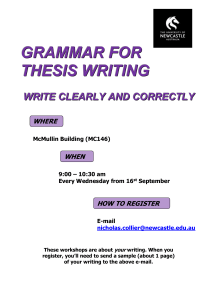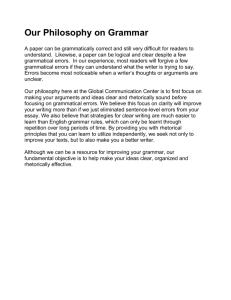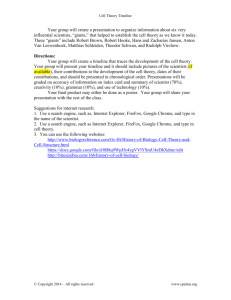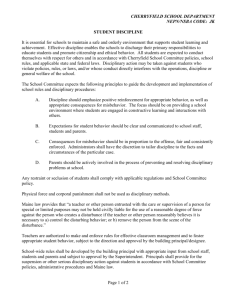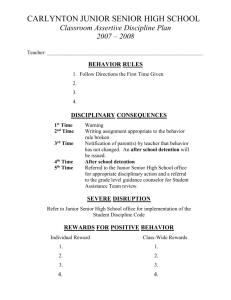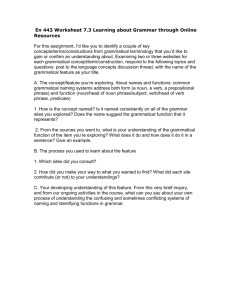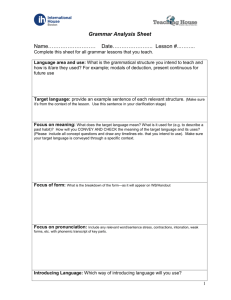Writing in Disciplinary Context
advertisement
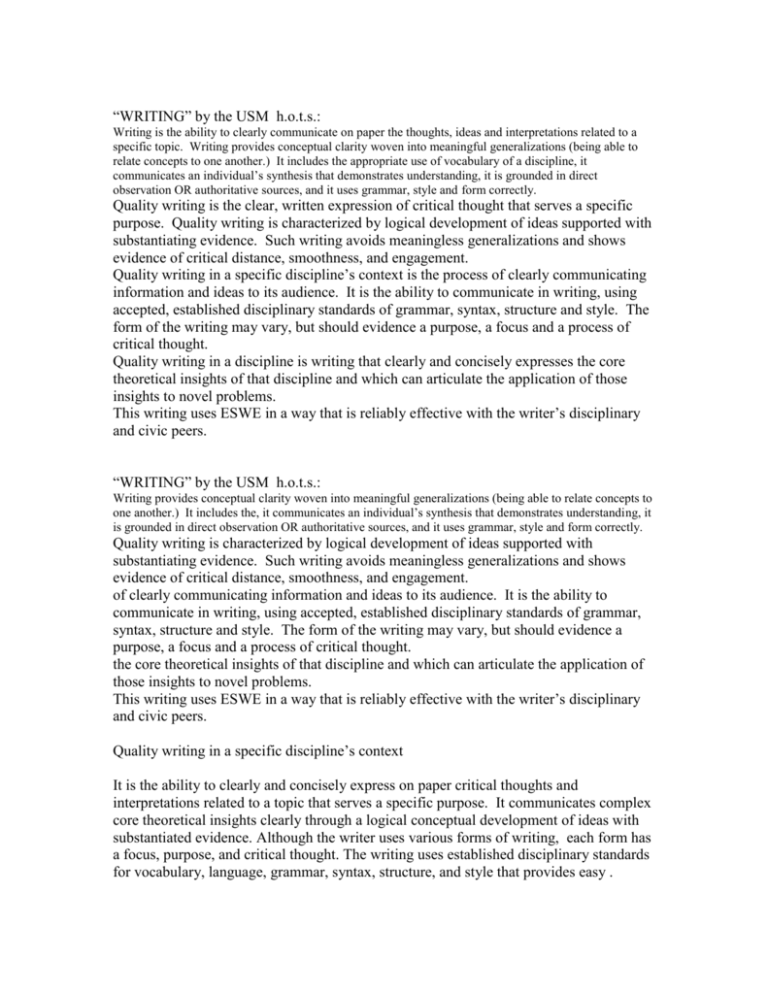
“WRITING” by the USM h.o.t.s.: Writing is the ability to clearly communicate on paper the thoughts, ideas and interpretations related to a specific topic. Writing provides conceptual clarity woven into meaningful generalizations (being able to relate concepts to one another.) It includes the appropriate use of vocabulary of a discipline, it communicates an individual’s synthesis that demonstrates understanding, it is grounded in direct observation OR authoritative sources, and it uses grammar, style and form correctly. Quality writing is the clear, written expression of critical thought that serves a specific purpose. Quality writing is characterized by logical development of ideas supported with substantiating evidence. Such writing avoids meaningless generalizations and shows evidence of critical distance, smoothness, and engagement. Quality writing in a specific discipline’s context is the process of clearly communicating information and ideas to its audience. It is the ability to communicate in writing, using accepted, established disciplinary standards of grammar, syntax, structure and style. The form of the writing may vary, but should evidence a purpose, a focus and a process of critical thought. Quality writing in a discipline is writing that clearly and concisely expresses the core theoretical insights of that discipline and which can articulate the application of those insights to novel problems. This writing uses ESWE in a way that is reliably effective with the writer’s disciplinary and civic peers. “WRITING” by the USM h.o.t.s.: Writing provides conceptual clarity woven into meaningful generalizations (being able to relate concepts to one another.) It includes the, it communicates an individual’s synthesis that demonstrates understanding, it is grounded in direct observation OR authoritative sources, and it uses grammar, style and form correctly. Quality writing is characterized by logical development of ideas supported with substantiating evidence. Such writing avoids meaningless generalizations and shows evidence of critical distance, smoothness, and engagement. of clearly communicating information and ideas to its audience. It is the ability to communicate in writing, using accepted, established disciplinary standards of grammar, syntax, structure and style. The form of the writing may vary, but should evidence a purpose, a focus and a process of critical thought. the core theoretical insights of that discipline and which can articulate the application of those insights to novel problems. This writing uses ESWE in a way that is reliably effective with the writer’s disciplinary and civic peers. Quality writing in a specific discipline’s context It is the ability to clearly and concisely express on paper critical thoughts and interpretations related to a topic that serves a specific purpose. It communicates complex core theoretical insights clearly through a logical conceptual development of ideas with substantiated evidence. Although the writer uses various forms of writing, each form has a focus, purpose, and critical thought. The writing uses established disciplinary standards for vocabulary, language, grammar, syntax, structure, and style that provides easy . Factors Top 10 a. b. c. d. e. f. g. h. i. j. Organization (Conforms to guidelines) Clarity Grammar and Syntax Focus Logical consistency Responsible & accurate (Proper use of Citation) Conceptual Development (views other perspectives) Clear sense of purpose Sense of audience & being of value Richness of Vocabulary and word usage Not significant k. Taking on an Objective view l. Effectiveness in editing their own work m. Artistry of expression n. Passion/Motivation o. Efficiency in Writing under constraints 45 37 23 19 19 20 14 12 6 7 C C B E D E D A A B 7 6 4 Novice Writers produce documents that: 1. 2. 3. 4. 5. lack a defined purpose and a clearly identified audience. Lack focus and contain substantial inaccuracies . Impede comprehension for lack of structure and clarity. Produces documents that frequently violate basic principles of grammatical structure, makes limited use of relevant vocabulary and exhibits a poor grasp of the vocabulary that they do use. State simple undeveloped ideas from their own point of view. Barely Proficient Writers produce documents that: 1. 2. 3. 4. 5. have ill defined purpose with a nebulous audience. Some focus and a few inaccuracies Convey a limited sense of organization and can be comprehended with effort. Produdes documents that generally adhere to the grammatical standards of the language and exhibit rudimentary command of relevant vocabulary. State semi-formed, partially developed ideas from an undefined point of view. Competent Writers produce documents that: 1. adequately satisfy a purpose and sense of audience. 2. Adequate focus and a few inaccuracies 3. Minimally confirm to guidelines and are adequately clear. 4. 5. Produces documents that reliably adhere to all the grammatical standards of the language and appropriately exploit relevant vocabulary. State thoughtful, developed ideas from a specific point of view. Professional produce documents that: 1. Have clear purpose for intended audience. 2. Clearly focused and essentially accurate 3. Are well organized, clearly conform to guidelines. 4. Produces documents that reliably adhere to all the grammatical standards of the language, as well as a measure of creative flexibility in the application of these standards, and demonstrate a broader command of the relevant vocabulary of the language. 5. State well developed complex ideas and acknowledge multiple points of view Expert Disciplinary Writers produce documents that: 1. have the intended effects on the targeted audience. 2. sharply focused and completely accurate 3. are organized to the level of structural transparency. 4. Produces documents that fully exploit the grammatical resources of the language and the full potential of the vocabulary. 5. completely develop original ideas logically and consistently, and that describe and evaluate multiple points of view.

